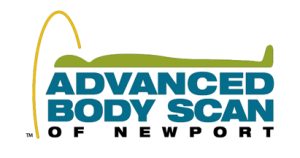What a coronary calcium score of 0 to 100 means:
A coronary calcium score of zero indicates that there was no detectable calcium in your coronary arteries. We know from peer reviewed published medical research reports that people without detectable coronary calcium are at very low risk for heart attacks. Does this mean with absolute certainty that you do not have arteriosclerosis or heart disease. Unfortunately, no test has that kind of accuracy but the predictive power of a zero Calcium Score is nearly 99%. We now know that for every one hundred people with a zero Calcium Score, only one will be found to have heart disease. Similarly, coronary calcium scores of less than 100 imply that the atherosclerosis is very early and mild and people with scores below this threshold are still at low risk for heart attacks.
Since the development of heart disease is a slow process, Advanced Body Scan of Newport advises patients with a zero or low score should have their heart scan repeated every two to five years.
What a coronary calcium score of 101 to 400 if you are under 65 or 101 to 500 if over 65 means:
If your coronary calcium score is between 80 and 400 if you are under 65 or 80 and 500 if you are over 65 then you already have a significant amount of plaque in your coronary arteries. The first page of your calcium score report you receive from Advanced Body Scan of Newport shows you eight of the images of your heart that were taken during your exam. The calcium deposits have been colored for easy identification; you may see the green or red dots on your heart. The last page of your report will show you in diagrammatic form where these calcium plaques were found. The finding of calcium and therefore plaque in you coronary arteries means that you already have heart disease and are at an increased risk for having a heart attack in the future. Advanced Body Scan of Newport advises that you now need to begin the lifestyle changes and contact you doctor to receive medical therapy to stop or reverse the progression of your heart disease. The medical treatment your doctor may prescribe may involve taking a class of prescription medications called statins, which lower your cholesterol level. You may already be familiar with some medications in this class, which include lipitor, crestor, pravachol, zocor and lescol. When you bring your Coronary Calcium report to your personal physician, he or she will advise you further on these medications. Advanced Body Scan of Newport also recommends that patients with a calcium score greater than 80 to begin taking a baby aspirin once daily and to follow the dietary recommendations of the American Heart Association. These recommendations are detailed in your handout but the main points of this diet are to eat in moderation, maintain a healthy weight, cut down on the fats in your diet and to eat more fruits and vegetables.
The majority of patients with scores between 100 and 400 still have only mild to moderate heart disease which will not detectable with conventional treadmill tests. Treadmill stress tests only find heart disease after the plaque has grown to occlude the artery by 70% or more. Advanced Body Scan of Newport does not been recommending routine treadmill testing for people with scores in this range unless your physician determines that a treadmill is necessary in your case. Advanced Body Scan of Newport advises that individuals with scores between 100 and 400 repeat their exam on an annual basis to make sure the score remains stable. A score growing at 15% or more per year means that the plaque is enlarging and more drastic measures are required to stop or reverse the heart disease process.
What a coronary calcium score above 400 if you are under 65 or above 500 if you are over 65 means:
If your coronary calcium score is over 400 if you are under 65 or over 500 if you are over 65 then you have extensive plaque in your coronary arteries and your risk for a heart attack is greatly increased. Calcium scores of this level are also associated the presence of large plaques that cause significant obstruction of the artery almost 50% of the time. Therefore; in addition to the treatment recommendations just given for patients with coronary calcium scores between 11 and 400, Advanced Body Scan of Newport also recommends that patients with these very high coronary calcium scores also undergo further diagnostic testing to determine the extent of the heart disease that is present. Your personal physician or cardiologist will determine the test most appropriate for you. The most likely test your physician may order is a treadmill stress test. The electron beam CT scanner used at Advanced Body Scan of Newport is also capable of taking a 3D picture of your coronary arteries, a CT coronary angiogram, that may be reimbursed by your insurance company. You should discuss all your options with your personal physician or cardiologist following your test.
Conclusion:
This concludes Advanced Body Scan of Newport’s introduction to the revolutionary heart scan for the early detection of heart disease. If you have any questions or would like to schedule an appointment, please call us at (866) BODYSCAN. More information can be found on our website at www.newportbodyscan.com or you can email us at mail@newportbodyscan.com. Thanks for watching.
